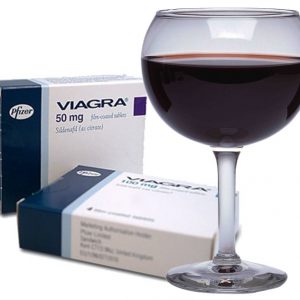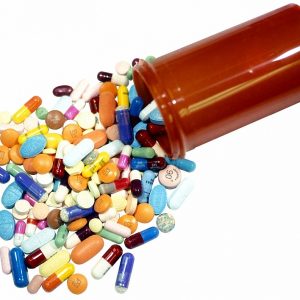Hormones are part of a well-coordinated and complex system. Their main function is to maintain correct functioning of all organs. Alcohol and potency, according to experts, not a good mix, as ethanol leads to a violation erectile function, and cause serious medical consequences.
Hormones are chemical messengers to control and coordinate the functions of tissues and organs. When the hormonal system is working properly, the exact amount of hormone is released at a certain time, the fabric is clearly responding to their messages.
The alcohol disrupts the function of the glands that secrete hormones, and functions of the tissues, sensitive to these hormones that negatively impact on health, including sexual.
Under the influence of ethanol, the following occurs:
- Suffering reproductive function and potency.
- Increased blood pressure.
- Disturbed energy metabolism.
- Retarded growth and development.
- Increased risk of osteoporosis (brittleness and fragility of bones).
Hormonal disturbances in men who abuse alcohol
Alcohol and pancreas
The sugar level in the blood is controlled by insulin and glucagon – the hormones secreted by the pancreas.

They work together to maintain a constant concentration of glucose in the blood. Insulin lowers glucose levels and glucagon increases it. Other hormones synthesized by the adrenal glands and pituitary gland, support the function of glucagon. A sharp drop in the level of glucose in the body leads to loss of consciousness or even damage brain cells.
The main source of energy for all tissues of the body is glucose which comes from food and is synthesized in the body or is released from the destruction of glycogen, which is stored in the liver.
Alcohol interferes with all three sources of glucose and interferes with the hormones that regulate its level.
In the initial stages of alcoholism developing hypoglycaemia, which is associated with slower production of glucose, enhanced insulin secretion and a decrease in hormonal response to low blood sugar level.
Chronic heavy alcohol consumption increases the level of glucose that leads to the development of diabetes. This is due to the following factors:
- the reduction of the body’s sensitivity to insulin;
- promote increased glucose intolerance;
- stimulation of the synthesis of glucagon and other hormones that increase blood sugar levels;
- change the effectiveness of drugs for the treatment of diabetes.
Studies have shown that alcoholism in severe form causing intolerance to glucose, especially in liver cirrhosis.
Alcoholism and the metabolism of calcium in the body
Hormones play an important role in maintaining calcium levels in the body, which is essential not only for strong bones and teeth, but also for some of the processes occurring in the body. Several hormones – parathyroid hormone, a hormone derived from vitamin D, and calcitonin work to regulate calcium absorption and distribution between bones and body fluids.

Chronic alcohol intoxication interferes with the operation of hormones, and, therefore, calcium metabolism and bone:
- Causes deficiency of parathyroid hormone and increases excrection of calcium.
- Disrupts the metabolism of vitamin D.
- Slows the absorption of calcium from food.
- Inhibits the activity of bone-forming cells.
- Violates the synthesis of reproductive hormones that affect bone density.
The above processes lead to the bone disease (osteoporosis), bone loss and greatly increase the risk of fractures.
Studies have shown that the effect of alcohol on bone tissue is partially reversible, with complete rejection of alcohol.
Alcohol and cortisol levels
The researchers found that alcohol consumption also increases the production of cortisol in the body, not only in the time when people drink, but later, when recovering from the effects of intoxication.
Immediately after taking cortisol increases blood pressure and even sharpens the attention; if we consider the long-term effects, disturbed structure of bone tissue, digestion, reproductive function, metabolism and healing processes.
Alcohol, fertility and potency
In the body there are many hormones that regulate the reproductive system of men. The main hormone is testosterone, which is synthesized in the testes.
In men, testosterone is responsible for the following aspects:
- Puberty.
- Spermatogenesis.
- Men’s sexual behavior.
Chronic alcohol consumption impairs the proper functioning of the testes and leads to hormonal disorders, reduced potency and infertility.
Uncontrolled taking high doses of ethanol, because of hypoandrogenism causes the following changes:
- the increase of the breast in men;
- baldness;
- a violation of the processes of spermatogenesis with subsequent infertility;
- persistent violation of erectile function beyond correction.
Alcohol in small quantities liberates and increases sexual desire, but in essence, alcohol is a depressant, it slows down brain activity, slows the respiratory rate and slows the pulse. Emotions and desires more freely, but if we talk about sexual ability, especially about the erection, the ethanol weakens it. During a normal erection the blood flow to the penis, fills the cavernous body, which gives the penis the firmness. Alcohol also dilates all the blood vessels in the body, including in the penis. The result is outflow of blood and an erection or becomes sluggish or is lost completely.
According to scientists, the abuse of ethanol leads to a decrease in libido – libido. Moreover, men who drink often develop testicular atrophy, and signs of feminization (femininity).
Chronic alcohol intoxication contributes to inflammation in the prostate gland. Symptoms of prostatitis pain in the perineum, urination disorders, and sexual disorders, including impotence, as a complication of long-existing problems.
Of course, from the occasional usage of alcoholic beverages complete impotence will not develop, but expect the following effects:
Currently, the term “impotence” is recognized by the majority of urologists are not quite correct, so often used the phrase “erectile dysfunction”. One way to address this delicate problem is a drug Viagra and its analogues.
The interaction of alcohol and Viagra
While taking drinks of alcohol and Viagra not always achieved a stable erection. There is evidence that drinking 2 glasses of red wine (300 ml) or 400 ml of beer does not prevent erection.

The research was conducted, which showed that 72% of men with severe alcohol addiction have several forms of sexual disorder. But in this case, taking Viagra or ineffective, or not effective at all. Many patients ask: “does Viagra with alcohol?” Experts believe that with a large number of definitely not. The abuse of alcohol, erectile dysfunction caused by persistent alcohol intoxication and changes in organs and systems on its background.
Ethanol distorts the action of Viagra and enhances its side effects:
The appearance of such side effects, for obvious reasons, does not improve sexual performance men.
In addition, alcohol affects your liver.
The main function of the liver and kidneys – removal of medical agents and products of metabolism from the body. Viagra 80% inactivated in the liver. If the organ is not functioning properly or busy deactivation of alcohol, the concentration of sildenafil (active ingredient of Viagra) in the plasma can reach dangerous levels. It is important to understand that too large dose of alcohol will eventually jeopardize the function of the liver.
If a man is not ready to refuse from drinking alcoholic beverages before sexual intercourse, and needs to use sildenafil, alcohol use is approached responsibly. This measure will help to prevent problems with the liver and the dangerous consequences of increasing the concentration of Viagra in the blood.
Alcohol and other drugs to increase potency
According to studies, 30% of men aged 65 to 80 years at the same time drink alcohol, Viagra and drugs prescribed for the various diseases. The active ingredients of various drugs enter into a chemical reaction. Disorders that require constant medication in this group of individuals, the following:
Elderly patients are often treated with multiple drugs at the same time due to comorbidities, but still regularly consume alcoholic drinks. Sometimes you just need to adjust therapy to achieve desired results.
Physiological aspects such that the same dose of ethanol can achieve higher blood concentrations in elderly subjects compared to young.
To protect yourself from side effects, always check with what not combined active ingredient of a drug you are taking.
With some drugs alcohol not working

While concurrent use of alcohol and certain drugs may cause side effects. They can be associated with the action of the active substances of medicines or develop under the influence of alcohol, and blocking important body functions. The interaction can also be due to the fact that alcohol alters the metabolism of substances in the liver.
Drugs and alcohol can potentiate each other. It is known that simultaneous use of alcohol and analgesics containing Morphine, Methadone, Meiden, Ketobemidone, Oxycodone, etc., has a more pronounced effect at greater risk of paralysis and death from respiratory arrest. This may occur even with usual dose of the drug. Antidepressants and antipsychotics in combination with alcohol have a perverse effect, is quite low doses, both alcohol and drugs. Human behavior under the influence of this “cocktail” is sometimes unpredictable.
The abuse of anabolic steroids in high doses gives rise to aggressive behavior, which is especially noticeable in case of simultaneous use of alcohol-containing beverages.
Antihistamines and alcohol increase drowsiness, reduce concentration, even at a moderate dose of alcohol consumed.
Most of the drugs used in the treatment of rheumatic and other pains in the joints and muscles, “flavored” with ethanol, affects the platelets. This leads to the risk of bleeding, for example with injury or surgical intervention.
Alcohol irritates the gastrointestinal tract and, therefore, should not simultaneously prescribed drugs, which by themselves can cause inflammation or gastrointestinal bleeding. The most dangerous Acetylsalicylic acid or Aspirin.
Frequent use of Paracetamol as analgesic, increases the risk of liver damage, especially when the abuse of ethanol.
Alcohol does not mix well with some antihypertensive drugs, as significant vasodilation causes sudden drop in blood pressure. The same problem may occur in patients receiving Nitroglycerin.
In addition, the ethanol I is administered concurrently with warfarin.
Chronic alcohol intoxication complicates the treatment. At moderate and high daily alcohol consumption over a period of weeks or months in large amounts are synthesized by enzymes that inactivate the drugs. This causes problems with the dosage of the drug because the therapeutic dose varies depending on the number of ingested ethanol. Examples of substances of which the decomposition can be accelerated by alcohol is Phenytoin against epilepsy and Warfarin, appointed for the prevention of thrombosis. Sometimes to define the line in which due to severe liver injury on the background of alcoholism, the ability to break down drugs is reduced, it is impossible.
About the simultaneous ingestion of alcohol and antibiotics there is no conclusive evidence about the harm on the body, in this case the obvious double strain on the liver. The basic rule is not to drink alcohol in large quantities in infectious diseases, and it is better to give up entirely.
To summarize:
- Alcohol abuse alters the functioning of all organs and systems and is a significant instigator for the development of various violations of hormonal background.
- Ethanol adversely affects sexual function of men, which leads to reduced potency.
- The desire to mix Viagra and alcohol to solve problems is only possible when the use of small doses of alcohol.
- Ethyl alcohol enhances the side effects of Viagra.
- There are a number of medications, their combination with alcohol unacceptable: first of all, it’s strong painkillers and psychotropic drugs.
- Aspirin and Paracetamol do not mix with ethanol.
- Regular use of alcohol complicates the selection of the dosage of the drug, which is not necessary to speak about the adequacy of therapy.



